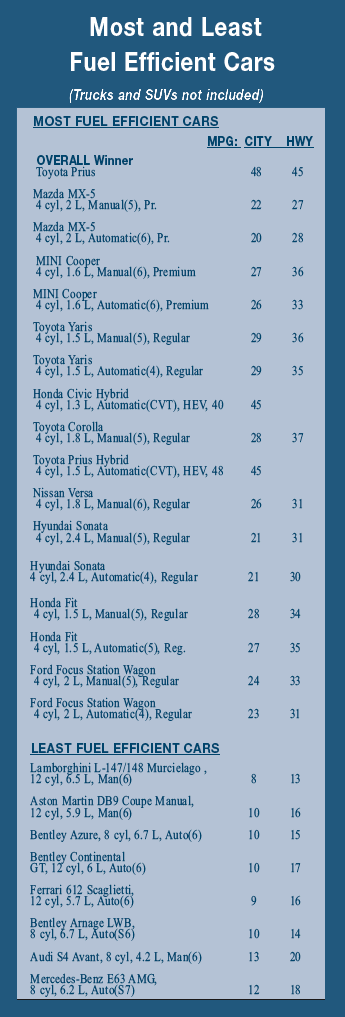|
|
| |

| |
Thinking About Buying a New
Vehicle?
Selecting which vehicle to purchase is the
most important fuel economy decision you'll make.
The difference between a car that gets 20 MPG
and one that gets 30 MPG amounts to $744 per
year (assuming 15,000 miles of driving annually
and a fuel cost of $2.97).
That's $3,720 extra in fuel costs over five
years! You can save $200-$1,500 in fuel costs each
year by choosing the most efficient vehicle
that meets your needs.
This can add up to thousands of dollars over
a vehicle’s lifetime. Fuel-efficient models come in
all shapes and sizes, so you don't have to sacrifice
utility or size.
You can also increase the fuel economy of you
current vehicle by adopting good driving habits
and maintaining your vehicle.
Visit www.fueleconomy.gov for gas mileage
estimates and more information for 1985-2007
model year cars.
|
|
| |
|
|
|
Save Money With These Car Tips
Gas prices are at historically high
levels and the long term trend is indicating
more of the same for American
drivers. If you operate one or more vehicles,
you know that saving money somewhere,
anywhere is important to maintaining
your budget. Here are some basic
tips to help you be financially wise when
it comes to managing your car expenses.
1. Take a look at your insurance. If
your car is worth less than three thousand
dollars, consider dropping collision.
Potential Money Savings: $100-
300/yr.
Ask your insurance agent how much
money you can save by raising the
deductible on your auto collision insurance.
Often, raising the deductible from
$200 to $500 can save you 10% to
30%. If you have a good driving record,
you could come out ahead. Potential
Money Savings: $50-225/yr.
2. Keep your tires properly inflated.
Your gas mileage will drop if your tires
are underinflated. Keep your tires at the
recommended pressure and your gas
mileage will remain steady.
3. Do not change your oil too frequently.
Unless you drive exclusively in
the city you do not need to change your
oil every 2500 miles. Most cars can go
up to 5000 miles before needing an oil
change. You will still need to change
your oil twice yearly even if you drive very infrequently.
4. Do some minor maintenance yourself.
You should be able to change your
wipers, air filter and battery yourself. If
you rely on others, your costs will
increase dramatically.
 5. Use a private garage. You do not
have to take your Toyota to the Toyota
dealership for maintenance (They just
charged me $133.00 to tell me my car
cap was bad... and for the new gas
cap). If you have a good, local garage
that is familiar with your make and
model you will, more than likely, save
money by using them instead. 5. Use a private garage. You do not
have to take your Toyota to the Toyota
dealership for maintenance (They just
charged me $133.00 to tell me my car
cap was bad... and for the new gas
cap). If you have a good, local garage
that is familiar with your make and
model you will, more than likely, save
money by using them instead.
6. Use regular gas. If you car requires
regular gas, do not splurge on premium.
Your car will not run any better and you
will have paid as much as 20 cents
extra per gallon.
7. Don't purchase an extended warranty.
The amount of money you pay for
an extended warranty is usually more
than what the warranty is worth. If you
feel that a particular car model requires
an extended warranty, perhaps you
should consider shopping for something
much more reliable.
8. Follow the manufacturer's recommendations.
The manufacturer of your
automobile will know how long parts
should last. Change your timing belt
before it becomes a problem, your fuel
filter at least bi-annually, and keep an
eye on your brakes, tires, and shocks.
Most cars built today do not need a
complete tune up for as long as 100,000
miles, so don't plunk down the $200 for
a tune up before one is necessary.
9. Don't "top off the tank" when pumping
gas. Some of the gas may end up
overflowing when it expands in the sun
or if you park on a hill. Potential Money
Savings: $20-53/yr.
10. Tighten up that Gas Cap. Make
sure it's on securely. Buy a new one if
your current cap doesn't fit snugly. Gas
easily evaporates from the tank if it has
an escape.
11. Be smart with the air conditioning.
On the highway, closed windows
decrease air resistance, so run the air
conditioner. But in stop-and-go traffic,
shutting off the air conditioning and
opening the windows can lighten your
fuel use. Air conditioning can lower your
fuel economy by 10 to 20%.
12. Drive Intelligently; don't make fast
starts or sudden stops. You're just
overexerting your engine and burning extra fuel. Gradual acceleration also
helps automatic transmissions run better.
Engine-revving wastes fuel, too.
13. Lighten up on the accelerator. The
faster you drive, the more gas you use.
For example, driving at 55 mph rather
than 65 mph can improve your fuel
economy by two miles per gallon.
14. Avoid Excessive Warm-ups. Even
on cold winter mornings, your car doesn't
need more than a minute to get ready
to go. Anything more and you're just
burning up that expensive fuel.
15. Do not rest your left foot on the
brake. The slightest pressure could
cause a drag that will demand additional
gas use, AND wear out the brakes sooner
> Back to Top |
|
